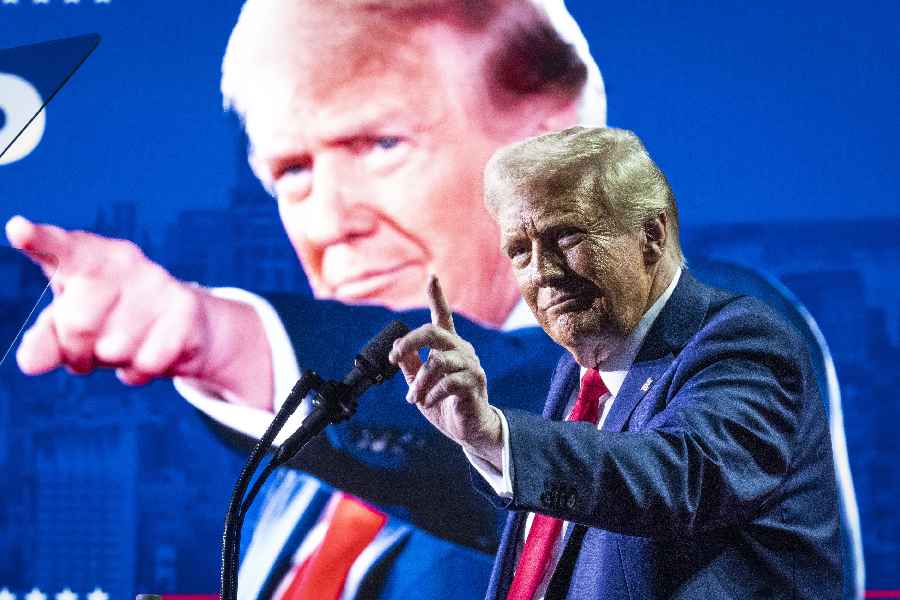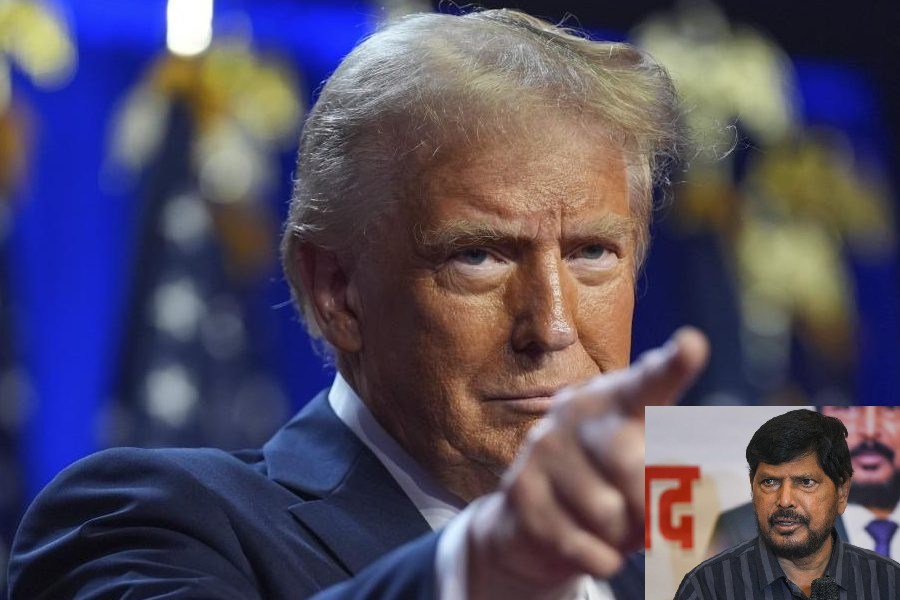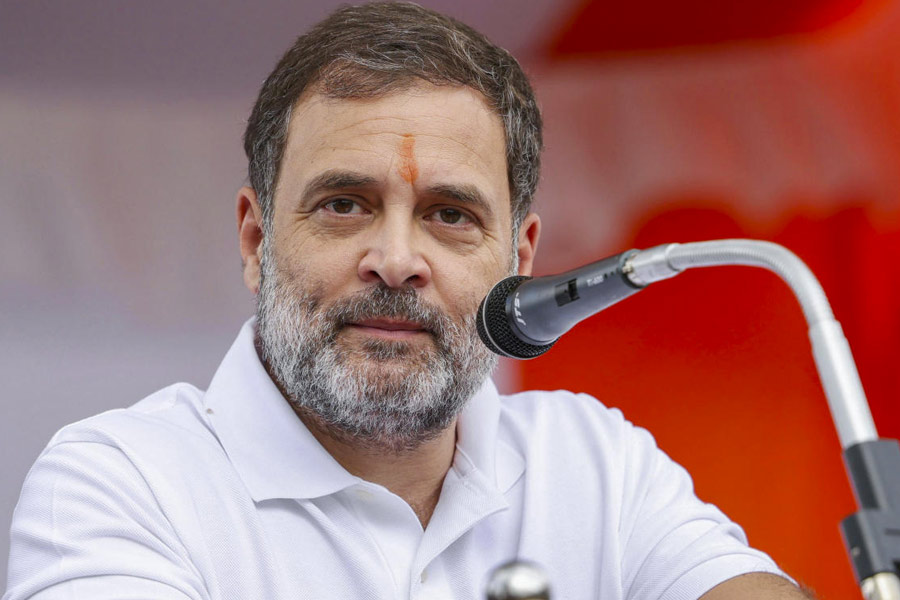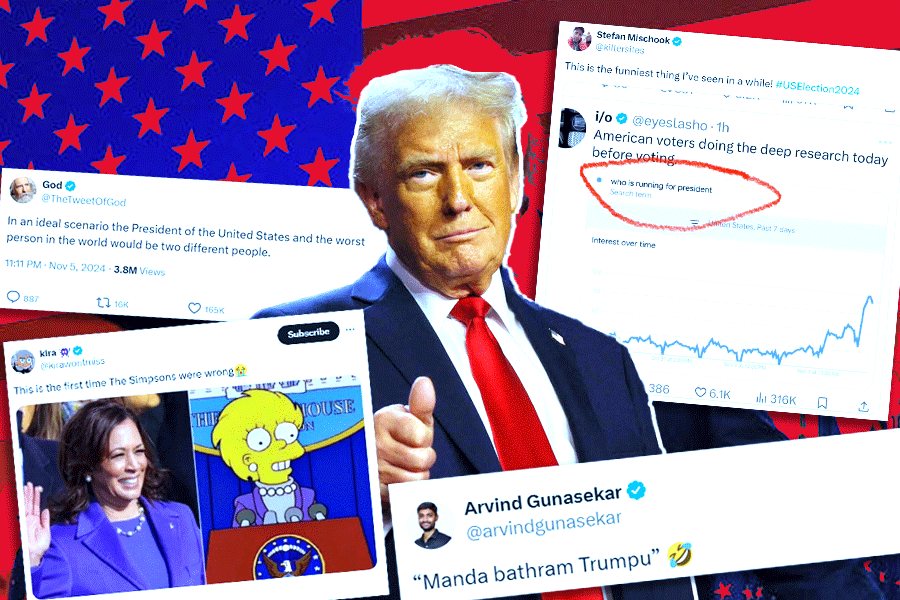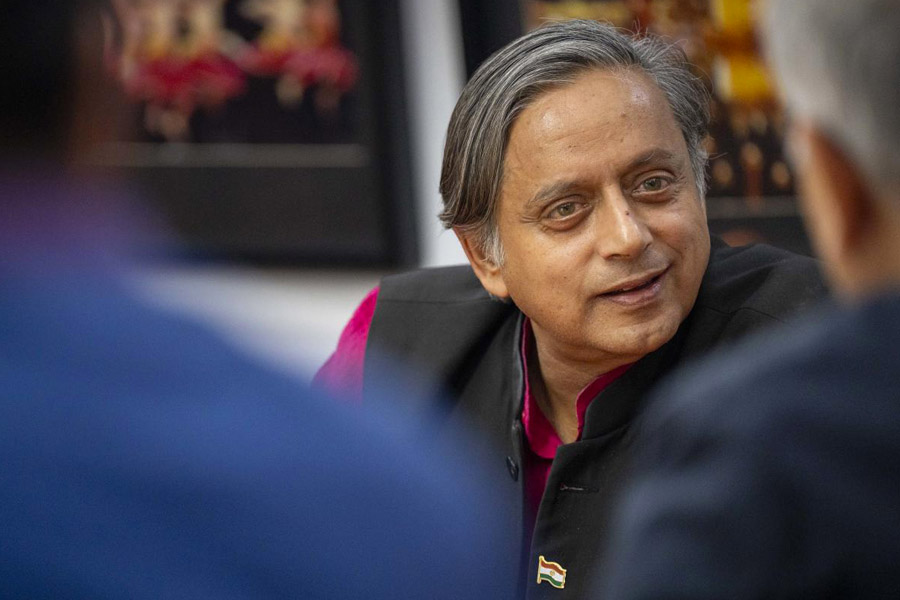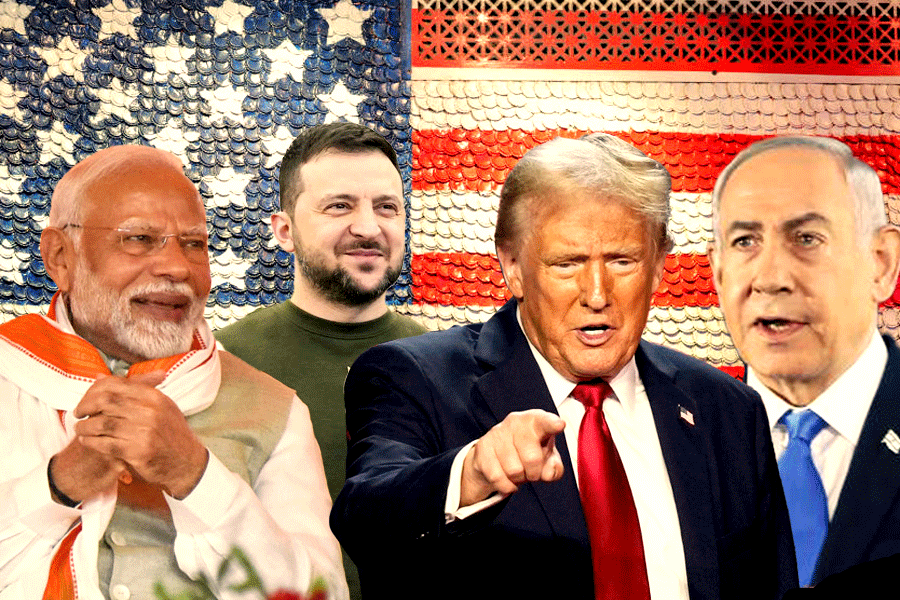By late January 2021, just days into Donald Trump’s unhappy new life as a former president, his world had shrunk to a size he could not abide.
Self-exiled in Florida as a twice-impeached semi-pariah, he golfed and glowered, boiling over his 2020 defeat and still refusing to acknowledge its legitimacy. His social media bullhorns had been silenced after Jan. 6, with Twitter citing “the risk of further incitement of violence.” His circle had dwindled to a smattering of junior aides, straining to keep him on the fairways and away from the television.
“Get the pool,” Trump instructed at one point, referring to the hive of reporters who had trailed him daily as president. “I want to make a statement.” He was told that he did not have one anymore.
By late February, Trump had waited long enough. In his first public appearance as a newly private citizen, he accepted an invitation to Orlando for a conference of right-wing activists.
“Do you miss me yet?” he asked, his arms splayed wide, as if waiting to be hugged.
It had been five weeks. Outside of that room, most Americans did not seem to miss him much at all.
Now, less than four years later, Trump’s arc back to power is complete — an extraordinary reversal carried off by a man who never especially changed, never accepted the reality of his 2020 loss, never stopped understanding the core of his own rampaging appeal, never doubted that he could bulldoze anyone in his way.
Day after day, his team’s decision-making revolved principally around what he wanted, what would soothe and sate him. And his instincts, as ever, were guided by raw impulses, a tendency toward race-baiting and near-boundless risk tolerance.
“I am who I am,” he told anxious donors privately last summer.
Yet if Trump’s nine-lives life can feel divinely fated to his allies — transcending scandal, felony convictions, two attempts to assassinate him — what becomes clear in a close accounting of Trump’s trajectory since 2021 is that none of this was inevitable.
His path back to Washington was the product of foresight and chance, brazen calculation and Trump’s intuitive political skills amid almost unfathomable campaign volatility.
As much as anything, it required figures at every rung of American civic and political life making choices that helped deliver Trump to this point.
Republican senators acquitted him after the Jan. 6 attack on the Capitol, even as some seemed to hope that he would be sidelined. The authorities pursued him and brought four criminal cases against him, one of which led to his conviction on 34 felony counts, but their actions only deepened his base’s attachment to its leader. Donors, conservative-media titans and social media executives determined, eventually, that opposing Trump was unsustainable. The Democrats initially stuck by an unpopular, visibly aging incumbent.
And the voters, appraising it all, saw it fit to rehire Trump.
Any political triumph has its sliding doors — the moments and pivot points that can feel decisive in hindsight. For Trump, the doors always seemed to slide open just in time.
“God loves Trump,” his aides would say, marveling at the way things always seemed to work out for him.
A measure of structure also helped. For all his perpetual tumult, there was one key decision that Trump never abandoned, despite appearing to wobble from time to time: He put Susie Wiles, a veteran Florida-based operative, in charge of his political apparatus. She became the rare top official from his three runs to survive an entire campaign.
But then, Trump is always his own chief strategist.
He embraced his legal peril as a political asset, defying generations of campaign wisdom and the counsel of some advisers, and coaxed supporters to celebrate his mug shot as an emblem of martyrdom.
He lied about the 2020 election until it became a litmus test on the right — ignoring the confidants who urged him to concede his loss and move on. His unwillingness to accept the truth repositioned him, in the eyes of his party, from a weak, defeated one-term president to a cheated officeholder seeking to reclaim what was his.
And he explicitly placed vengeance at the center of his political project, vowing to punish his domestic enemies and to purge his party of dissenters.
“Get rid of them all,” he said in his 2021 speech in Orlando, addressing the Conservative Political Action Conference.
Even then, nearly two years before he would officially announce his candidacy, his mind wandered quickly to another campaign — and to rewriting the history of the last one.
“Who knows?” Trump teased, to rapturous cheers. “I may even decide to beat them for a third time.”
Political Exile? Not for Long.
Several Republican lawmakers were unequivocal: Whatever he might try next, Trump was finished.
Fifty-seven senators had found him guilty of “incitement of insurrection” after the Jan. 6 attack on the Capitol. But they fell short of the two-thirds majority needed to convict him, which would have let the Senate move to disqualify him from holding future office. Many assumed his political career was over anyway.
“I just don’t see how Donald Trump will be reelected to the presidency again,” Sen. Lisa Murkowski of Alaska, one of seven Republicans who voted to convict, said at the time.
Trump was locked out of social media platforms, an afterthought for mainstream outlets, happily ignored by Democrats.
But the truth is that he was never as diminished as it appeared — or as his opponents hoped.
Privately, he took pains to avoid portraying his White House life as a past-tense endeavor, inhabiting the fiction that he remained the rightful occupant. He issued statements adorned with a presidential-looking seal. He refused to discuss a presidential library. The word “former” was not to appear before “president” in official communications.
Just weeks after Jan. 6, he received a visit from Kevin McCarthy, then the House minority leader, to discuss midterm strategy. McCarthy had previously said that Trump bore responsibility for the mob that attacked the Capitol.
Many senior Republicans — especially Mitch McConnell, the Senate minority leader who had railed against Trump but voted to acquit him — were less than thrilled when Trump made it clear that he planned to play a major role in the 2022 midterm elections.
Ambitious contenders made beelines to his Mar-a-Lago estate to flatter him, play golf with him and beg for his endorsement, which was still the party’s most valuable commodity.
A top priority for Trump: ousting the House Republicans who had voted to impeach him.
“Two down, 8 to go!” he gloated in a statement when two of them announced their retirements from a changed party. While some of his candidates won, including JD Vance, whom he endorsed for the Senate in Ohio, others fared disastrously.
Still, Trump was plainly the party’s most powerful voice.
It helped that the events of Jan. 6 were being falsely reframed across a growing swath of his party as a smear against mostly peaceful protesters countering election fraud.
It helped even more, in August 2022, when federal authorities searched Mar-a-Lago for sensitive documents that prosecutors later charged Trump with keeping unlawfully.
Many Republican voters and activists were galvanized by the confrontation. Would-be primary rivals like Gov. Ron DeSantis of Florida saw few options but to defend Trump, reestablishing the former president as his party’s unquestioned alpha.
Eager by then to announce his campaign, Trump had his criminal defense in mind: He believed, according to friends, that a formal White House bid would buoy his claims that any investigation was a political hit job.
And the Democrats’ better-than-expected performance in the midterms seemed to commit them to a dangerous bet: With a drubbing, President Joe Biden might have been pressured to step aside, as many voters hoped he would at his advanced age. Now, he was all in.
Trump wanted his rematch, and saw no one capable of stopping him.
A week after Election Day, Trump kicked off his third presidential campaign at Mar-a-Lago, addressing a room of supporters that pulsed with a favored track of his from “Les Misérables” (“Do you hear the people sing? Singing the song of angry men?”) as he prepared to enter.
“I’m a victim, I will tell you,” he said from the microphone. “I’m a victim.”
Indictments, and Endorsements, Pile Up
As a candidate again, Trump paid close attention to the language that lawmakers issued about his run.
Only full-throated endorsements (“the ‘E’ word,” he called them) were acceptable, he told associates. Rote expressions of support (“the ‘S’ word”) were insufficient.
But to many elected Republicans, Trump still looked vulnerable. Donors were sidling up to his opponents. Key organs of conservative media were effectively shunning him: Fox News, which in 2023 reached a $787.5 million settlement after airing baseless claims about the 2020 election, was refraining from interviewing Trump, and giving kinder coverage to some of his competitors
The New York Post, the newsprint id of the Murdoch empire, seemed at times like an arm of the DeSantis campaign-in-waiting. “DeFuture,” it labeled the governor after his blowout reelection. (Trump’s campaign rollout was greeted with a small, slashing blurb: “Florida man makes announcement.”)
Trump did little to reassure the skeptical. Shortly after his announcement, he dined at Mar-a-Lago with Nick Fuentes, an outspoken racist, and Kanye West, who was losing his corporate partnerships at the time after making a series of antisemitic remarks.
And while the spectacle of federal agents searching Trump’s home had stirred some Republican voters, other allies worried that the shadow of his criminal proceedings might eventually sink him.
Legally, his team deployed a blizzard of delay tactics intended to push his trials beyond the 2024 election. Politically, Trump wanted to keep the charges against him front and center, a spectacularly risky approach.
Some senior advisers raised concerns on uncomplicated grounds: Being charged with crimes is rarely professionally advantageous.
But Trump’s instincts were not just to lean into the charges but to organize his entire campaign around them.
As president, Trump had trained Republicans to come to his knee-jerk defense amid the FBI’s investigation into his 2016 campaign’s ties to Russia.
By the time Alvin Bragg, the Manhattan district attorney, brought hush-money charges against Trump in 2023, the campaign hardly needed to send out talking points about the case being a “witch hunt.” The entire right-wing universe already knew what to say.
Helpfully to the campaign, even some of Trump’s critics had questioned the decision to prosecute the case, which struck some as trivial compared with the more serious charges Trump faced in other jurisdictions. (In addition to the hush-money case and the classified-documents case, Trump faces two separate criminal cases concerning his efforts to retain power after his 2020 loss: a federal case brought after an inquiry from special counsel Jack Smith, and a state case in Georgia. The futures of both are in doubt with Trump’s victory.)
Suddenly, Trump was all over Fox again, hailed now as a martyr. His criminal arraignments became media spectacles. His aides back-channeled with network producers to turn his motorcade rides from airport to courthouse into live television events, evoking the O.J. Simpson Bronco chase.
His fundraising and poll numbers spiked.
Most important to advisers, Trump’s main rivals for the nomination, DeSantis and Nikki Haley, found themselves sidelined and compelled, awkwardly, to defend him. Trump did not even deign to debate them.
He won the nomination, easily, and set about painting Biden as a doddering fool. Trump’s team agreed to an early debate, scheduled for June. It would exceed their wildest expectations.
Biden was a train wreck, wholly unable to make a coherent case for himself. Trump, despite his characteristic falsehoods and blustering, seemed vigorous by comparison.
He became, for perhaps the first time in his political life, the unambiguous favorite to take the White House.
A Summer of Unimaginable Upheavals
Trump walked onstage in Butler, Pennsylvania, on July 13 as a solid polling leader against a hobbled incumbent.
He walked off, bloodied and fist-raising, as nothing less than a figure of destiny to many supporters.
“I’m not supposed to be here tonight,” he said of the assassination attempt at the Republican National Convention in Milwaukee five days after the shooting.
“Yes, you are!” the room chanted back.
Inside the arena, his victory could feel almost preordained. And Biden was flailing, at war with his own party as he refused to abandon his bid.
Things changed quickly.
When Vice President Kamala Harris suddenly became his opponent, Trump, 78, proved almost ostentatiously incapable of focusing on the argument that his advisers hoped to push: that Harris was an extension of Biden’s failures.
Instead, Trump could not resist openly questioning her Black identity. He aired groundless conspiracies from the online right about Haitian immigrants eating pets in Ohio. The more he campaigned, the more he reminded some voters of his unruly presidency, which the haze of time and COVID-19 had obscured.
But even as Trump made what seemed like major unforced errors, his pollster Tony Fabrizio saw improvements in his internal surveys. After a low point in late August, when Harris overtook him in several battleground states, Trump regained his footing.
He redoubled his pre-Harris strategy. He mostly avoided the mainstream media, with the exception of Fox News. He recorded interviews with podcasters who have large audiences of exactly the kind of people the Trump campaign had identified as its most fertile targets: young men who are pessimistic about the country, bro-ish in outlook and often disinclined to vote. (Their support was essential as Trump seemed to have lost ground among women after appointing three of the Supreme Court justices who overturned Roe v. Wade.)
At his rallies he was often incoherent, holding forth on Hannibal Lecter’s fictional brutality or Arnold Palmer’s genitalia, but rarely boring to his most zealous supporters, who continued to thrill at his merger of politics and entertainment.
He flashed some hustle on the campaign trail: the man with the golden tower serving fries at McDonald’s.
Trump also had the help of the world’s richest man.
In a manner unparalleled in modern history, Elon Musk deployed his time, energy and vast resources to the goal of getting Trump elected. After he bought Twitter (which he renamed X) he not only welcomed Trump back to the platform but ultimately turned it into a pro-Trump machine. He heavily funded a super political action committee to support a get-out-the-vote initiative.
And he joined Trump at rallies back in Butler and at Madison Square Garden, where the candidate mocked those alarmed by the increasingly authoritarian echoes in his language.
“When I say ‘the enemy from within,’” Trump taunted, “the other side goes crazy.”
After the shooting in Pennsylvania, some close to Trump had insisted he was a changed man, eager to unify.
If anything, in the months that followed, he seemed to become even less inhibited.
His closing events could feel almost custom designed to antagonize late-deciding voters.
The Democrats? “Demonic,” he said.
Journalists? If they get shot, he said, “I don’t mind.”
Trump’s first White House term? “I shouldn’t have left,” he said.
Modulation would never come; it never had to, as Trump had wagered all along.
He is still promising retribution against his enemies and a campaign of mass deportation.
He is still adamant that he has never lost an election and never could.
He still knows what his followers see in him — the fury, the fight, the balm of “us” in an us-versus-them world.
He is who he is: the president-elect.
The New York Times Services

